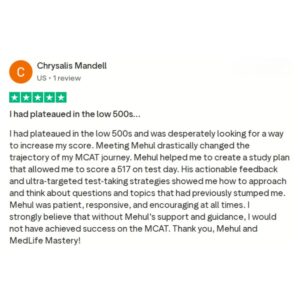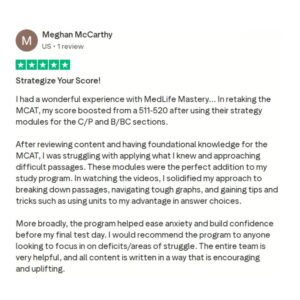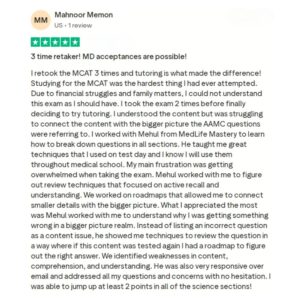Dear future doctor,
If your MCAT score isn't increasing fast enough...
If you got a disappointing score on your recent practice exam...
If you feel like you have a long way to go before you reach your MCAT score goal, that you absolutely NEED to open doors to med-school...
The first thing we want to say to you is:
It's going to be okay.
How do we know?
What if we told you that almost every 90+ percentile MCAT scorer felt the same way at some point during their MCAT prep?
What if we told you that there came the point in every "current med-schoolers" MCAT prep journey where they felt 'stuck,' where they felt like there was not enough time, where they felt like there was way too much information to study, where they felt like med-school admission might be unattainable...
Yet today, those same students are on their way to becoming physicians 
Over the years at MedLife Mastery, we’ve seen premeds who have improved their MCAT scores from 499 to 512, from 489 to 513, from 500 to 521, from 505 to 517, from 50th percentiles to 90th percentiles (and the list goes on)... in a matter of weeks.
If you still don't believe us, we have many case studies/success stories here on this blog, on our YouTube channel, and on our podcast of real premeds who skyrocketed their scores to a competitive level in less than 30 days
We recommend you check those out, plus most of us (the tutors here at MedLife Mastery) have done the same. You can read our bios as well.
Now, after hearing countless success stories, interviewing dozens of top scorers, and having gone through it ourselves, we can genuinely say that for nearly every top scorer, something "clicks" that enables them to skyrocket their MCAT score very quickly.
There comes a moment where they 'get it.' Our ultimate goal is to give you the key insights you need to make it 'click' for you too!
Again, we know all this because we've been interviewing and researching top MCAT scorers (exclusively) and dissecting their journey to MCAT success for over seven years.
We've documented precisely what most of them did when they were struggling to improve their MCAT score when test day was really close.
We've also documented what resources they used, how they first began prepping for the MCAT, how they dominated each specific section on the MCAT, how they planned out their MCAT study schedule, what they did during the last month on the exam, how they prepped for test day itself, and so much more!
As you can imagine, some patterns begin popping up when you dive deep into that many MCAT success stories. Those patterns are the keys to MCAT success and fast-tracking your score to a med-school-worthy position.
The best part is that we want to share all those insights with you so you have a complete step-by-step system to dominate the MCAT!
"Success leaves clues. Go figure out what someone successful did and model it. Improve it, but learn their steps. They have knowledge." - Tony Robbins
A 520 MCAT Scorer's Powerful Piece of Advice For Those Eager To Increase Their MCAT Score
We know it’s discouraging when you can’t get over the 500 or 505 or 510 mark. It’s frustrating when your score isn’t increasing. Worst of all, it’s scary not knowing if you’ll increase your MCAT score enough when the MCAT date is much closer than you’d like.
We also get that you might wonder if you should push your MCAT date further. Or if you’ll have to retake the MCAT.
We get it all because we were there too!
But your search for answers has brought you here, and it is our intention that after you read our material and see how so many top scorers got over the challenges you're currently facing, you won’t have to look elsewhere.
There's a lot of information in this article that will help you increase your MCAT score, but none of it will matter if you don't restore your optimism, your confidence in yourself, and your abilities.
So before we say anything else, remember you have what it takes. You didn't come this far, to only come this far.
Dan Green, a 520 scorer we interviewed in December 2018, increased his MCAT score by 14 points in the last 30 days before the MCAT! He gave one of the most powerful pieces of advice to the MedLife Mastery Community that we'd like to share with you right now...
"Your low MCAT score does not define who you are... it defines your MCAT study process."
If you can truly absorb that top scorer mentality, if you can truly commit to doing whatever it takes to improve your process, you will get through this. You will increase your MCAT score really quickly.
We promise
With that said, we want first to highlight what it's going to take to separate yourself from those who never end up increasing their MCAT score and those who do and get into the med school of their dreams...
The Difference Between Those Premeds Who Improve Their MCAT Scores to Be Competitive For Med-School and Those Who Never Do
Increasing your MCAT score is not about how much you’re studying and memorizing. You’ve probably already been doing your best with studying, but it’s not being reflected in your score.
At the same time, we know (and trust that you know this too) that you’re great at the conventional type of studying after years of nonstop schooling and ‘content-based’ exams.
Yet we're sure you've realized by now that the MCAT is much more brutal than those 'content-based' exams you're used to. This means you can't prep for it as you've prepped for the exams you're used to.
If it was just about studying and memorization, nearly every premed would be conquering the MCAT. That would be inefficient for admission committees in many ways. The last thing they want is to make the MCAT something you’re comfortable with.
Know AAMC Intentions With The MCAT
Knowing AAMC's intentions is a crucial factor.
If you’re going to increase your MCAT score by 10 points or more and if you’re aiming to get a competitive overall MCAT score, here’s the first thing you need to know…
The difference between those who get 90+ percentile MCAT scores and those who don’t are the strategies they use to train themselves to think in the way AAMC wants you to think.
Read that last sentence again because that’s what it really boils down to.
What kind of strategies are we talking about? For example, 90+ percentile MCAT scorers know exactly how to analyze passages, questions, and answer choices, to pinpoint correct answers with a level of speed and accuracy that average premeds will never get.
Another example is that top scorers know how (and when) to strategically take and review practice exams that lead to the greatest insights in how they can increase their MCAT score on the next practice exam.
Another example is that top scorers know how to train themselves to sit through a 7.5-hour-long exam with complete focus and finish the exam with extra time remaining.
We have dozens of strategy examples to prove that 511+ scorers are doing what the average premed isn’t doing, which naturally and usually puts them in the top 10% percent of MCAT scorers. As a result, their med-school application gets to the top of the pile.
Your main objective, if you want to increase your MCAT score by 10 points or more, is to apply efficient, correct, reliable (proven) MCAT study and testing strategies to get yourself to start thinking like a top scorer.
The rest of this article has five parts. Each part will cover a top scorer strategy and way of thinking that will shift your MCAT prep mindset and, as a result, increase your MCAT score substantially.
The first strategy is about conquering a struggle that, according to most top scorers on the MCAT, is the biggest culprit of low MCAT scores...
This is usually the number one reason most MCAT writers don't see their score increasing fast enough.
Applying this strategy and fixing this challenge alone might be all you need to improve your MCAT score to the competitive 510+ level…
Part 1 of 5: The Biggest Culprit Keeping MCAT Scores Stagnant + How Top Scorers Overcame It To Quickly Increase Their MCAT Scores
Do you find yourself getting things wrong that you thought you knew? Do you notice mistakes that clearly show you weren’t reading carefully?
You’ve done the studying. You know the material in and out, yet you have very little time left before the MCAT, and you don’t get why your score isn’t increasing as much as it should.
Top MCAT scorers have realized that the MCAT is more than a test about the content on the exam. It’s even more than just critical thinking...
One of the biggest mistakes many premeds make is not realizing that the MCAT is also a test of your mental and physical stamina.
The reason your score is likely not increasing is because of stamina. MCAT testing endurance is a significantly underestimated skill set. Yet, it is one of the MAJOR skills that most top MCAT scorers give credit to, allowing them to increase their MCAT scores.
(Also, if you're struggling with finishing the exam on time or finishing specific sections of the MCAT on time, stamina is the reason for this)
As we've mentioned, this exam is unlike any other test you’ve written. It’s significantly endurance heavy. Do you really think you can sit there and use your brain effectively in test mode for 7.5 straight hours without any stamina training? HIGHLY unlikely.
Beyond the 2-3 hour mark, most top scorers knew that they had to train their minds to stay focused and in ‘peak-performance’ state for the rest of the exam. You too, really have to train your endurance and stamina if you want to see your MCAT score improve.
We’ve come across many premeds, and a good guess would be that the average MCAT writer studies for 1 hour and takes a break for another hour during MCAT prep.
The problem? Lack of stamina and ability to focus.
If you do this as well, or some form of it, it’s not your fault. This is how you’re used to studying because that’s all you need to do throughout your undergrad life to get good grades. But for the MCAT, and the rest of your med-school career in fact, this needs to change.
You can also be certain that stamina is your primary culprit if you find you did well on all the courses tested on the MCAT (Biology, Chem, General Chem, O Chem) but aren’t doing well on practice exams.
Maybe you find yourself ‘getting through’ 7-hour practice exams and think you can do it. But ‘getting through’ and staying on top of your mental game the ENTIRE time is a different story. To reach the 510+ competitive level, you need to become a test-taking machine using intelligent energy management strategies.
If you’re more aware of yourself, you may have even had multiple realizations already of how you’re not using your mind enough to think critically throughout the entire 7-hour time span.
So how do you improve your MCAT test-taking stamina, and as a result, improve your MCAT score? Here are two highly effective strategies recommended by the 90+ percentile MCAT scorers we've interviewed…
Improve Your Stamina, Improve Your MCAT Score – Strategy 1: Using Practice Exams Efficiently
You’ve probably already heard that the “MCAT is a marathon, not a sprint.” Most people have heard it. Yet, the students who take it seriously and act on such a valuable insight, are the ones who get the highest MCAT scores.
Top scorers always see the MCAT as a marathon. You don’t want to compete in a marathon if you’ve never adequately completed one before! You’ll lose.
You should have completed as many marathons as possible before the big event to ensure that stamina will NOT be a problem for you. When stamina doesn’t get in your way, only then can you properly focus on technique, strategy, and analysis.
When conquering the MCAT, your practice exams are your marathons. Remember, MCAT stamina can only be strengthened by how you practice.
The key to dominating the MCAT and developing optimal stamina is full-length practice exams. As many as you can. Non-stop full length practice exams.
We know top scorers on the MCAT who studied for less than 30 days (two studied for the MCAT for only 18 days), and they all scored in the top 2%. It's almost unreal, but what do they all give credit to? Practice exams.
If you want to increase your MCAT score by 10 points or more within 30 days, one of the best things you could do is to go hard on full-length, timed practice exams.
This will not only train your stamina, but will also train you to actually apply the material you have been studying.
At the same time, these top scorers knew exactly how and when to take practice exams and review them strategically. We cover a lot of powerful top scorer practice exam strategies in detail in our self-paced MCAT strategy video course.
We highly recommend checking out those courses we have for you because, with every practice exam, you need to extract maximum insights and learning so that each exam can have its maximum impact on your score.
Especially when there are extremely limited AAMC practice exams, you want to ensure you're not wasting even one of them. Knowing how to take AND review them strategically is essential to improving your score.
Next, common advice you'll receive from top scorers is that during practice tests, never stop the timer. Once you’ve started a section, you need to finish it. Remember that simulation of the actual MCAT exam is critical.
The same applies to taking breaks – only take them like you would if you were writing the actual MCAT.
To start, see how long you can go for with the first practice exam. Be aware of when you burn out. That’ll give you a good idea of how much stamina improvement you need.
After you do your practice exams, you’ll need to analyze them. You can examine them for deficiency in stamina by using the following strategy…
Improve Your Stamina, Improve Your MCAT Score – Strategy 2: How To Analyze Practice Exams for Deficiency In Stamina
Break up your practice exam into hourly phases, after you’ve written it and are in analysis mode.
Your goal is to determine which phase of the practice exam you get the most incorrect answers during practice tests.
Break up your phases by hours. Where are you struggling the most? In the first and second hour? The third and fourth? Fifth and sixth? Or the last one?
If you’re getting the most incorrect answers in the first hour, your issue might be anxiety or an inability to get comfortable and into your mental ‘zone.’ Your solution could be that you need to get in your ‘zone’ before the test, so you don’t waste that first hour or two not performing optimally.
How do you get in the ‘zone’? Everyone has their ways. Many MCAT Masters leveraged flashcards and notes and read them through before the exam. Do what works for you. For some, doing that gets them worried and anxious.
This is why simulating real test day exams is essential – so you can get to know yourself, what works for you, what throws you off, etc.
If you’re getting most answers incorrect in hours four to seven, your issue may be that you’re losing focus. You need to ask yourself why you’re losing focus. Again, everyone is different.
If you’re getting most answers incorrect in the last few hour(s) of the MCAT, you’re probably in the same boat as 85% MCAT of writers.
Most people are burnt out at this point. This is your point of leverage. Do not waste this.
Put in the effort to perform at your best during this phase. If you can, you’re setting yourself up for a competitive score.
Sometimes, there could be several easy questions you don’t want to avoid. They could be sitting right at the end of a passage or section.
You need to cultivate awareness and focus at the last stage especially, so you don’t miss these easy points that others will surely miss because of burnout.
Remember, the top scorer MCAT strategy recommendations you'll get, whether they're in this article, in our other posts, in our courses, or even while working one-on-one with an MCAT Mentor, are extremely valuable only if you act on them and try to see their results for yourself.
We'll give you the map to a top scorer, but YOU need to follow it.
Increasing your test-taking stamina could very likely be the only key you need to give your MCAT score a massive increase in a very short time.
In Part 2, we want to reveal the smartest path you can take during your MCAT prep to ensure you're confident studying, knowing there can't be a better way to prep for the MCAT...
Read Later: How Troy Increased His MCAT Score By 13 Points In Just 3.5 Weeks (From 499 to 512)
Part 2 of 5: To Become A Top MCAT Scorer, Think Like A Top MCAT Scorer.
As someone urgently seeking ways to improve your MCAT score, how often do you feel confident in the MCAT advice you’re receiving?
Over the many years we’ve been around, and from the thousands of premeds we’ve encountered, we’ve realized that too many premeds are studying for the MCAT using traditional, outdated, and ineffective strategies that individuals (and companies) with no credibility have spread.
They wonder why their MCAT scores aren’t increasing and start blaming themselves. Everyone knows there must be some proven strategic way to do well on the MCAT, so everyone asks each other. People give their opinions, but no one knows for sure if what they're doing is right.
It's rare to get helpful and reliable MCAT advice, strategies, techniques, and recommendations to master the MCAT from credible sources.
The people on forums could be anybody – who knows what their score is? Do they post screenshots of their scores? Have they been officially verified by a third party? We’ve never found this to be the case.
Unfortunately, many of these MCAT strategies are also from big-name prep companies that many students pay a lot of money for.
Using big-name companies is not a problem for content learning, but we wouldn’t be so quick to adopt their strategy advice (which is the most critical aspect of MCAT prep).
Also, friends who are writing the MCAT with you aren’t any better. Asking them for advice is like applying for a job and asking the candidate next to you (who is applying for the same position) how to master the interview…
Why not just ask someone who has already been hired? Someone who has already mastered the interview….
We like to emphasize that the logical and the smartest thing to do is to use the same MCAT strategies and hacks of those who have proved their credibility, those who are true masters of the MCAT...
Those who are where you want to be (med-school). Those who scored what you want to score (i.e., 510+).
Wouldn't that be the most reliable, quickest, and smartest path to increasing your MCAT score?
“If I have seen further than others, it's by standing on the shoulder of giants.” - Isaac Newton
It's simple, and it’s our ultimate MCAT success philosophy - if you want to be the best, learn from the best.
Imagine if you could sit with one or two 90+ percentile MCAT scorers and ask them to give you their entire MCAT prep plan and strategies...
How much (and how fast) of a score increase do you think you'll get from just a one-hour meeting with them?
That's what we call 'high leverage' thinking. Those who think this way are always on the lookout for those things that require the least investment of time, energy, and money, but can yield the most results.
At this point of your MCAT prep, if you're looking for the biggest gains in your score as soon as possible, you need to look for 'high leverage' investments.
Some people are lucky because they have an older sibling or friend who mastered the MCAT and helps them out. Others pay ridiculous prices to get tutored by them.
It's not fair for most premeds, and we know it. Not everyone has such connections or hundreds and even thousands of dollars to spend on MCAT tutors who have received an impressive MCAT score.
If you want to take this approach, you must ask yourself where you can find top scorers of the MCAT? Also you don't want to just talk to one, you want to talk as many top MCAT scorers as possible to notice patterns and commonalities that you can trust actually work.
The best part is they're not competing with you since they're already in med-school or have already written the MCAT, so they're almost always happy to help you with genuine information you can trust.
Unfortunately, we've realized over the years that even after knowing this, almost no premed is going to spend the energy, time, and money to find and meet top MCAT scorers…
Which makes sense. As a premed, you have way too many things on your plate anyway to fit a huge project like that in.
Well that’s where we come in…
We've been researching and compiling proven MCAT strategies from strictly top scorers of the MCAT for over half a decade now. You can get access to them all in our blog articles like the one you're reading now, in our emails, and in our courses 🙂
We still hold paid top MCAT scorer interviews so we can keep up to date with any new methods, processes, tips, and MCAT score-increasing shortcuts that we've never seen before.
We've seen patterns amongst these elites in how they prep for the MCAT. Many of these top scorers have scored in the 100th percentile, gotten 132 on CARS, are in top med-schools, and even personally know creators of MCAT exams.
We conduct this research because we want to make this stressful and probably one of the hardest phases of your life as a future doctor, much easier.
We know that if you had a reliable blueprint, a map, that tells you exactly how to proceed with studying for the MCAT in a way that top scorers before you have done, you get clarity, you get confidence, and most importantly, you get results…
There are some things only experience teaches you. Top scorers are experienced and have figured it out already, so you can just copy them without unnecessarily wasting your own time and energy, hoping to figuring it out after one or more attempts.
Read Later: How Dan Increased His MCAT Score By 14 Points In Less Than 30 Days (From 506 to 520)
In the next section of this article, we’re going to cover three effective MCAT prep strategies based on real case studies of how 510+ MCAT scorers who were once struggling, quickly increased their MCAT scores by 10 points or more...
Part 3 of 5: Three Proven Top Scorer Strategies Highly Recommended To Improve Your MCAT Score
Imagine leaving the exam room on your MCAT test date smiling, feeling satisfied and eager to find out how you did...
Imagine feeling a knowing that the exam went just as well as it usually did on the practice exams you’ve been taking, where you know what kind of score result you can expect a month from now....
A month later – you were right, and you’re overflowing with joy! Would you come back and help other students who are struggling with the MCAT, who are hoping to be in your shoes soon?
Well, a lot of top scorers did come back and because of those generous future doctors who were willing to give back, we’re able to share these tips and strategies with you. We hope you choose to do the same when you get your competitive MCAT score 🙂
Here we have three proven strategies that are highly recommended for you to start applying to improve your MCAT score.
The first is about practice.
Top Scorer MCAT Strategy 1 – Avoid This Common Trap To Improve Your MCAT Score
Everyone writing the MCAT has a unique background that they’re strong in. For some, it’s Physics and they can breeze through that section on the MCAT. Others who are English majors, generally have an easier time with CARS.
The trap is that we like to spend time reading and learning the content that we’re comfortable with. We enjoy the process of ‘understanding’ easily. We like getting the right answers. We feel smart. As a result, almost unconsciously and automatically, most premeds spend a lot of time in their comfort zone with their ‘comfort subjects’.
Almost every top scorer we’ve come across stresses this point hard; get out of your comfort zone and focus on your weakest areas. Right now, you know which is your weakest section. You know which is your second weakest section. Prioritize these subjects in your MCAT prep schedule based on which needs most attention and which needs the least.
Don’t try to balance studying through all sections. Trying to balance studying like that, will NOT help balance your MCAT score! Which is extremely important. You don’t want to send in an MCAT score that clearly highlights a ‘problem section’. Med-schools want ‘all-rounders’.
Plus, if you’re scoring 128 or 129 on CARS for example, you’re probably just missing the hardest questions on that section. Instead of trying to get that score to 130, your time and energy is MUCH better spent trying to get your 126 C/P score to a 128+. It’s definitely an easier improvement.
We know sometimes it feels like ‘it’s so close to 130, I just need to spend a little more time to get it there’. It’s like a game, where you’re so close and you just want to hit that target. But realize that’s your ego talking, not your ‘inner doctor’!
Top scorers know the key is to maintain awareness of these internal biases that could be holding you back from studying in the smartest way possible.
The next MCAT tip mentions specific ways to increase your level of awareness and cognitive capacities to increase your MCAT score quickly…
Top Scorer MCAT Strategy 2 – Increase Your Mental Performance To Increase Your MCAT Score
Time and time again, we hear 510+ scorers mention how they incorporated two important habits into their MCAT prep…
Meditation and exercise.
Students dismiss these habits because they’re not ‘tangible’. When you’re doing these things, you’re not actually doing anything MCAT-related. The flawed premise most of us have is that if you’re not doing anything MCAT related, it’s not going to help you on the MCAT.
This is the mentality of the average scoring MCAT writer. To be fair, this is more a rational justification most people make to avoid stepping outside their comfort zone. Although, on an internal level, we believe everyone knows that these are beneficial activities.
Top scorers on the other hand (and the most successful people in the world), know that these are activities that strengthen and ENHANCE your mental and physical abilities.
Scientifically proven benefits of daily meditation and exercise include improved memory, reduced stress and anxiety, increased focus and attention, better verbal reasoning, improved mood, increased creative thinking, better problem solving and decision making, better information processing, improved energy levels, and so much more.
When you spend 20 minutes of your day meditating and 30 minutes of your day exercising, that 50-minute time and energy investment will give you back SO much more efficiency in your MCAT prep, than if you hadn’t done any of those things.
These are perfect activities to incorporate when you’re taking breaks for studying. Start incorporating these daily habits and like many top scorers before you, you’ll notice an improvement in every aspect of your MCAT prep life, including your score.
For more about meditating and how to do it, check out this article.
Top Scorer MCAT Strategy 3 – Improve Practice Test Taking Abilities To Improve Your MCAT Score
If your scores aren't improving, if you're not able to get beyond a certain threshold like the 500 mark, you’re likely not not leveraging practice exams resourcefully. Here we’ll cover a few quick highly recommended top scorer practice exam strategies.
First, a major factor in using practice tests efficiently to increase your MCAT score, as top scorers recommend, is to constantly identify and reflect on the reasons for your mistakes.
If you're doing anything to stall your reflection process, you're hurting your MCAT score.
For example, if you get a discouraging score on a practice test, it's tempting to go hard on the books. Don't. Don’t study from a place of anxiety. Take some time to rest and go back to the practice test AFTER you're in a clear, focused, positive mindset. This could be a few hours later or the next day.
Giving yourself time to rejuvenate is important because it helps you refresh your mind and avoid burnout. When you rest, you’re able to proficiently see your mistakes and your reasons for making them.
This will greatly help you identify exactly where you keep making the same errors, why you’re making them, and that’s when you’ll identify exactly what you need to do to STOP making them. As a result, you’ll see your MCAT score rise with every practice exam you take AND correctly analyze.
Also, top scorers ensure that they not only analyze why they got questions wrong, but also WHY they got questions right. When you’re done your practice exams, don’t ignore all your correct answers. Take time to go through those as well.
Another key top scorer practice test strategy is to schedule practice tests very regularly to help maximize your score. Don't leave them to later. You want to track your progress and not be surprised at what you see when the exam is too close.
So far, in a way we’ve kept you ‘inside the forest’ interacting with individual trees, giving you some strategies and opening your eyes to how you can improve your MCAT score using proven methods and strategies of top scorers before you.
As we end this article, we want to fly you out of the jungle and give you a ‘bird’s eye view’ of the entire forest, so you can see the big picture. So you can see exactly how a top scorer, and more importantly, a future doctor, looks at the MCAT.
This is the perspective that’s going to evolve you into preparing for the MCAT like a top scorer, and hopefully keep you on the path of consistent increases in your MCAT score…
Part 4 of 5: Boosting Your MCAT Score With "The Big Picture Mindset" That Kept Top MCAT Scorers Motivated, Focused, & Strategic
For most premeds, there are just a few moments in life as painful as the moment of realizing that med-school is no longer a possibility....
That all those years of hard work and money invested, has gone to waste.
Sadly, this year approximately 60% of med-school applicants aren’t going to get in.
Some will be forced to take a gap year. Many will watch their friends receive acceptances and won’t be able to help but feel left behind.
Just take a look at the 2017-2018 through 2020-2021 application and admission stats below taken straight from the AAMC website:
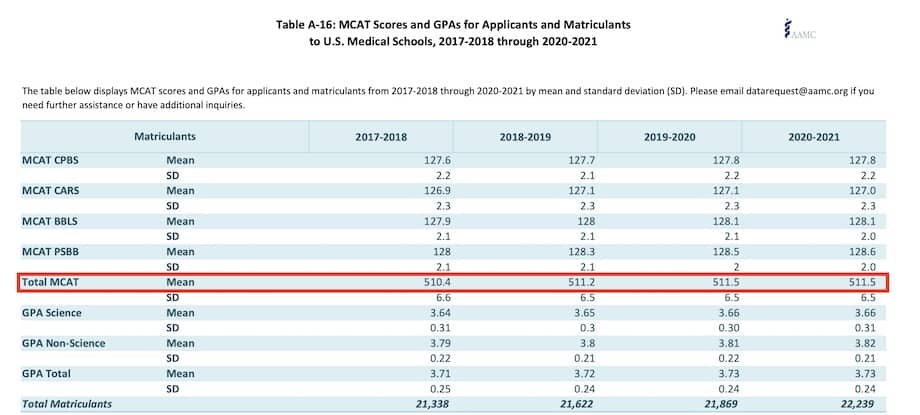
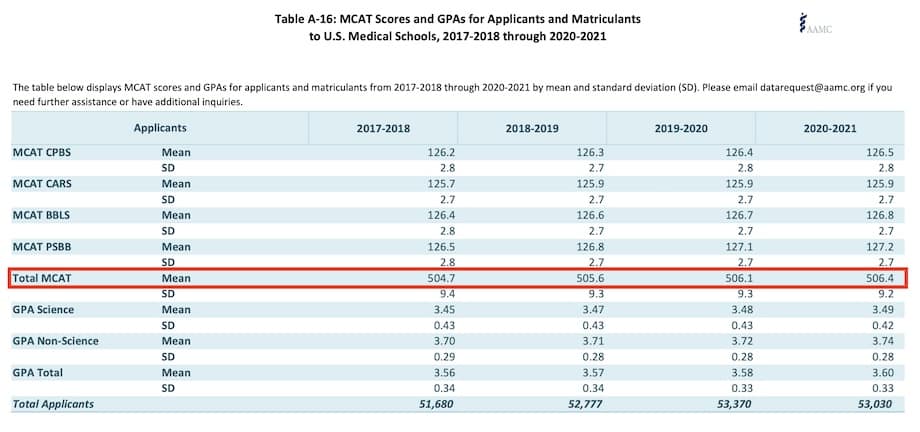
Total Applicants 2017-2018 – 51,680
Mean MCAT Score 2017-2018 – 504.7
Total Applicants 2018 – 2019 - 52,777
Mean MCAT Score 2018-2019 – 505.6
Total Applicants 2019 – 2020 - 53,371
Mean MCAT Score 2019-2020 – 506.1
Total Applicants 2019 – 2020 - 53,030
Mean MCAT Score 2019-2020 – 506.4
Looks like the average MCAT score that students are applying with increases every year.
Total Matriculants (admissions) 2017-2018 - 21,338 ️
Mean MCAT Score for Matriculants 2017-2018 - 510.4
Total Matriculants (admissions) 2018 – 2019 - 21,622
Mean MCAT Score for Matriculants 2018 – 2019 - 511.2
Total Matriculants (admissions) 2019 – 2020 - 21,869
Mean MCAT Score for Matriculants 2019 – 2020 - 511.5
Total Matriculants (admissions) 2020 – 2021 - 22,239
Mean MCAT Score for Matriculants 2020 – 2021 - 511.5
Clearly, this is a competitive journey with every premed fighting to secure their future as a doctor...
And probably the number one factor that decides every premeds fate of becoming a doctor? You can see it clearly - it's the MCAT.
It determines so much more than most average-scoring premeds realize. Top scorers internalize and recognize the true power it holds - and you should too, because that's where a lot of your motivation will come from. That's what will get you preparing smarter than everyone else.
In fact, here’s an insider look at what’s happening behind the scenes with admission committees’ (AdComs) when it comes to student MCAT scores...
Think about it, when you have over 12,000 applications for a class size of 120 students, you need a way to filter out how many applications you’re going to manually review.
So med schools use computers to screen out applicants. Using a computer to filter based on MCAT scores is the easiest way to do this. Which means if you don’t meet the minimum score for the med-school you applied to, your application is automatically sent to the rejection pile.
Which means no human will ever see your application. Which means the years spent sitting through all those long premed classes, are all wasted.
All the extracurriculars you squirmed to fit into your busy schedule, sacrificing all the “family and friends” time, are all wasted.
Knowing this keeps top scorers motivated, and it should do the same for you.
At the same time, this also tells you something else…
If the MCAT was created as a ‘filtering strategy’, it must be created in a way that pulls out the select few who have prepared for it a special way compared to the vast majority…
The vast majority will be preparing exactly how they prepared for premed classes. Unlike you, the vast majority of MCAT writers won’t have come across MedLife Mastery. Which is unfortunate because what any top MCAT scorer will tell you is that first, you must realize that what worked in your premed classes won’t work for the MCAT.
Most MCAT test writers don’t know this or don’t know the true extent of this fact, but getting a decent score in your premed classes is a joke compared to the MCAT.
They made the MCAT into a completely different monster. It tests much more than just how well you know the content. This is why the majority of MCAT test takers walk out of the exam shaking with anxiety...
Knowing they'll have to re-test.
You might already know that the MCAT is primarily a critical thinking and analysis exam. But the reason why you'll see most test writers walking out of the exam speechless, struck by confusion and worry, is because they didn't know this one important truth:
In an exam that tests your critical thinking and reasoning skills, you're guaranteed to see questions that have hidden traps, surprises, never before seen content, and trick questions swaying you towards the wrong answers.
If you’ve done practice exams, we're sure you’ve already seen this torture at play. This is one of the reasons you finish the exam and feel like you guessed on way too many questions...
Or worst is when you feel like you actually did well on the exam only to find a horrible score staring you in the face.
So it’s not your fault if you've been feeling frustrated, overwhelmed, and confused during your MCAT prep because the MCAT is created to throw you off your game...
To get you completely outside your comfort zone. To be overwhelming and unlike anything you’ve ever seen before.
Now you must be wondering why the AAMC would do things like create questions with content that they know students won't recognize.
The answer is simple and many top scorers know this:
Because the MCAT was made to identify future doctors.
In the beginning of this article, we mentioned one important point:
The difference between those who get 510+ MCAT scores and those who don’t, is the strategies they use to train themselves to think in the way AAMC wants you to think.
One of the main goals of the MCAT is to test your reasoning and critical thinking abilities in a way that's identical to what doctors have to do every day, with every patient they meet...
So the MCAT is a filtering strategy to get students who are already thinking in this particular way, through the med-school doors. Why?
Because as a doctor and as med student, you're going to experience the unknown all the time...
An example is when your reading passages, especially a CARS passage, and you know (just as most top-scorers do), that the answer is in the passage...
At the same time, you know you have to find the answer quickly. It's not like the answer is in your head . Which means you have to develop the ability to think on your feet.
How good are you at thinking on your feet?
When you read a CARS passage, we're sure you've already experienced seeing all this information that you don’t know the meaning to...
Or you've read information that is difficult to make sense of...
In scenarios like this, can you still find the answer on the spot?
The average premed can't do this and this is where top MCAT scorers stand out. The average premed runs out of time on the CARS section and ends up having to guess way too much.
Top scorers know it all comes back to 'thinking like a doctor.'...
Just like when you become a physician, you’ll be constantly presented with information you’ve never seen before. Now, how are you going to help your patient solve their challenge?
The skill is in truly being able to understand your patient. In the same way with CARS, top scorers know that the skill is in truly being able to understand the author of the passage.
So naturally, all the top scorers we've researched, have come up with brilliant ways to understand the author of the passage that doesn't require you to really 'get' everything the author is talking about.
There are shortcuts, techniques, and strategies that top scorers use, that makes their ability to go through passages and find the right answer 10x easier than what a normal premed would do.
You can learn ALL of these strategies, and all the strategies you'll ever need to know in our self-paced MCAT strategy courses, but remember, it all comes down to knowing that you're being tested on if you are able to think like a doctor.
As you progress in your "becoming a DR." journey, you'll have to train your mind to to think strategically and to be able to take on anything out of the ordinary that comes at you.
You’ll have to be able to spot the traps from a mile away and at a quick pace.
Top scorers realize that med-schools don't want to teach you how to think like this from scratch...
They just want people who ALREADY think like this to join.
Knowing all of this, one of the most effective courses of action you can take right now is getting yourself in the mindset where you look at the MCAT NOT as something that’s a dreaded barrier to med-school, but as something moulding you into becoming who you dream to be one day… a doctor…
The key is to not fight the MCAT. Instead, dance with it. Prepare not for a big exam date, but a performance date. Practice your performance and perfect it by recognizing where you keep stumbling.
Most importantly, learn how to perform using the right techniques, with the right mentors who have already received multiple standing ovations.
Take on a positive lens where you can enjoy this journey and this process. If you truly can get what we’re saying, if you can truly get why top scorers internalize this idea, you’ll see it reflected the speed at which you improve your MCAT score.
Read Later: How She Increased Her MCAT Score By 6 Points In The LAST Week Before The MCAT
Part 5 of 5: Finding the Right Ingredients To Elevating Your Score & Avoiding "MCAT Prep Insanity"
Albert Einstein said that the definition of "insanity" is "doing the same thing over and over again and expecting different results."
Today, we hope you’ve already made the decision that you’re going to change something in the way you’ve been preparing for the MCAT.
Achieving your maximum MCAT score to get into med-school starts with understanding that if your scores aren't increasing at all, or aren't increasing fast enough, you need to make some changes.
You need to fix your mistakes you’re unknowingly making that are holding your score down AND/OR you need to add the right methods to your MCAT prep that can push your score up.
You just need to find the combination of the right ‘ingredients’ that work for YOU and your learning style.
The key is to get a collection of reliable MCAT strategies, and test out which are the ones that are going to maximize your MCAT score.
We have that collection for you. A collection of the most reliable, most effective MCAT study and testing strategies on the planet, in the Complete MCAT Strategy Course.
Inside this course, which you can start going through in the next few minutes, you'll find a step-by-step system to achieve your competitive MCAT score... so that med-schools are compelled to reach out to you.
You can enroll in it it by clicking the link below. When you click that link, you'll also see stories of real premeds and how they used these strategies to score over 510 by increasing their MCAT scores in huge jumps.
Today, these students are in med-school living out a reality they once only imagined. To get you to that same reality is our passion, our mission, and our sole purpose....
But we can only show you the door to that reality. You're the one that has to walk through it.
You got this,
The MedLife Mastery Team
Your MCAT Success Mentors
P.S. The most important question you can ask yourself right now is are you willing to spend the time and energy it will take to learn and apply a smarter approach to your MCAT prep?
We've found most premeds don't want to spend time and energy to figure out the right approach. It feels like the MCAT is closer than ever before and there's no time to 'make changes'.
A lot of top MCAT scorers were facing these same challenges, but they clearly managed to get over it. They realized that spending time to learn the right way to prep for the MCAT is like spending time sharpening your axe before cutting down a massive tree.
Sure, sharpening the axe takes some time and energy, but that pays off tremendously when it's time to chop.
Top MCAT scorers don't view changing their MCAT prep as time wasted, but time invested.
So before you leave, make a commitment to yourself...
A commitment that you'll invest the time to "sharpen your axe", which means identifying and using strategic methods to improving your approach to MCAT prep and as a result, improving your score.
If you're willing make that commitment, we can guarantee you'll see your score hit the 510+ mark.







 To help you achieve your goal MCAT score, we take turns hosting these
To help you achieve your goal MCAT score, we take turns hosting these 

